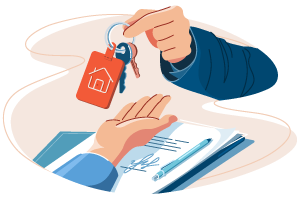Valuation Expert Witness: Property Dispute Resolution
When property disputes escalate into legal proceedings, whether through litigation or during a divorce settlement, an objective and accurate valuation of the assets is required.
Unlike a standard market appraisal, a valuation expert witness provides an independent, impartial assessment that can stand up to legal scrutiny. Strict court rules govern this specialist role, specifically Civil Procedure Rules (CPR) Part 35, ensuring the valuation serves the court's needs, not just those of one party.
What is a Valuation Expert Witness?
A valuation expert witness is an independent, impartial professional appointed to provide specialist opinion evidence on the value of a property in legal proceedings.
Unlike a standard property valuation for sale or purchase, their primary duty is to the court, not to the party instructing them. This ensures their assessment is objective and can withstand rigorous legal scrutiny.
Primary duty to the Court
The overriding duty of an expert witness valuer is to assist the court on matters within their expertise. This duty overrides any obligation to the person who has instructed or paid them.
This principle, enshrined in Civil Procedure Rules (CPR) Part 35 in England and Wales, is fundamental to maintaining the integrity of expert evidence in litigation and divorce settlements.
Role in legal disputes
The role of a valuation expert witness is critical in various property disputes where an accurate and unbiased property valuation is essential for a fair resolution. This includes:
- Divorce: Providing a fair market value for matrimonial assets, such as the family home or investment properties, to facilitate equitable financial division.
- Property Litigation: Assessing property values in professional negligence claims against other valuers or surveyors, boundary disputes where value is impacted, or disagreements arising from joint home ownership agreements.
- Inheritance Disputes: Valuing properties within an estate for probate or disputes among beneficiaries for inheritance.
- Professional Negligence: Determining the correct value of a property at a specific point in time to assess losses caused by negligent advice.
Their expertise ensures that the court has a reliable and impartial basis upon which to make decisions regarding property assets, contributing significantly to a just outcome.
Call or send us a message to request a callback or an email answering your queries about our surveys.
Our UK-based survey team can help you choose the right level of home survey for your property, at no extra charge.
There's no obligation to instruct. We'll make sure you understand your options and provide a free, fixed-fee quote for our best-value survey to meet your needs.
No robots, no call centres. Property challenges solved.
Party-Appointed vs. Single Joint Expert
When a valuation expert witness is required for legal proceedings, there are two primary ways they can be appointed: as a party-appointed expert or as a Single Joint Expert (SJE). Each approach has different implications for cost, impartiality, and the litigation process.
Party-Appointed Expert
A party-appointed expert is instructed by and acts primarily for one of the parties in a dispute.
While they still have an overriding duty to the court (as per CPR Part 35), their instructions come from a single side.
Each party can appoint their own expert, leading to two separate expert reports.
- Control over Instructions: The instructing party has more control over the specific questions asked and the scope of the expert's work.
- Advantage in Complex Cases: May be beneficial in highly complex cases where different perspectives are genuinely helpful, or where one party needs specific areas explored in depth.
- Potential for Bias (Perceived): Despite the overriding duty to the court, there can be a perception of bias, and the court may view reports from party-appointed experts with more scrutiny.
- Higher Costs: Each party bears the cost of their own expert, leading to significantly higher overall expert fees for the case.
- "Hot-Tubbing": Party-appointed experts may be required to meet and discuss their findings, and sometimes give evidence concurrently in court (known as "hot-tubbing") to narrow issues.
Single Joint Expert (SJE)
A Single Joint Expert (SJE) is instructed by and reports to all parties in a dispute. Their role is to provide a single, independent, and impartial opinion on the valuation matter for the benefit of all parties and the court.
This is the preferred approach in many cases, particularly in family law and less complex property litigation, as it promotes efficiency and reduces costs.
- Impartiality: The SJE's report is seen as truly independent and impartial, carrying significant weight with the court.
- Cost-Effective: All parties share the cost of a single expert, making it a much more economical option. This directly addresses the "costs of expert witness valuations" concern.
- Efficiency: Avoids the need for multiple reports, potentially conflicting opinions, and lengthy debates between experts, streamlining the process.
- Less Control: Individual parties have less direct control over the specific instructions, as these must be agreed upon by all parties.
- Court Preference: Courts often encourage or direct the use of an SJE unless there's a compelling reason not to.
Which is better?
The choice between a party-appointed expert and a single joint expert valuation depends on the specific circumstances of the dispute.
While a party-appointed expert offers more control, an SJE is generally preferred by the courts due to their inherent impartiality, cost-effectiveness, and efficiency.
In many divorce and property disputes, the court will direct the appointment of an SJE unless one party can demonstrate a strong reason why this would be inappropriate.
Expert Witness Report - the requirements
An expert witness valuation report is not merely a standard property valuation; it is a formal document prepared specifically for legal proceedings and must adhere to strict rules to be admissible and persuasive in court.
In England and Wales, the primary framework governing such reports is the Civil Procedure Rules (CPR) Part 35 and its accompanying Practice Direction.
CPR Part 35 Compliance
CPR Part 35 sets out the rules for expert evidence in civil cases, including property disputes and divorce settlements. Compliance with these rules is paramount for any valuation expert witness and their report. Key requirements include:
- Duty to the Court: The report must explicitly state that the expert understands and has complied with their overriding duty to the court.
- Impartiality: The expert must act impartially and objectively, providing an unbiased opinion.
- Statement of Truth: The report must contain a statement of truth, signed by the expert, confirming that they believe the facts stated in the report are true and that the opinions expressed are their true and complete professional opinions.
- Instructions: The report must set out the substance of all instructions received, whether written or oral, and identify any questions that fall outside the expert's expertise.
- Methodology and Assumptions: It must clearly state the methodology used to arrive at the valuation, the facts relied upon, and any assumptions made.
- Relevant Documents: A list of all documents the expert has referred to or relied upon must be included.
- Qualifications and Experience: The expert's qualifications, experience, and professional body memberships (e.g., RICS for property valuers) must be detailed.
- Summary of Conclusions: A clear summary of the expert's conclusions must be provided.
Importance of a compliant report
A non-compliant report can be rejected by the court, leading to delays, increased costs, and potentially weakening a party's case.
Therefore, instructing an expert witness valuer who is highly experienced in preparing CPR Part 35 compliant reports is essential for ensuring the valuation evidence is robust and accepted by the court.
Book a FREE* 15-minute meeting with a property dispute specialist who will listen to your issue and suggest ways forward, including the costs, with no obligation to use our services after the free meeting.
- What are you due on sale?
- How to sell where one person doesn't want to.
- Mediation and Settlement Agreements.
- Applications to court, including Declaratory Orders, Regulatory Orders, Occupational Rent.
How are property valuations determined?
When an expert witness valuer assesses the fair market value of a property for legal disputes, they employ rigorous methods to ensure the valuation is accurate, defensible, and impartial. If you aren't facing a legal dispute, you should look to get a current market valuation instead.
Unlike a quick online estimate, an expert witness property valuation involves a detailed process that considers numerous influencing factors.
Key methodologies used:
RICS (Royal Institution of Chartered Surveyors) qualified valuers typically use a combination of valuation approaches, with the most common being:
- Comparable Sales Method (Market Approach): This is the most widely used method for residential and commercial properties. It involves analysing recent sales data of similar properties in the same or comparable locations. Adjustments are then made for differences in size, condition, age, features, and other relevant characteristics.
- Income Capitalisation Method (Investment Approach): Primarily used for income-generating properties (e.g., buy-to-let, commercial investments). This method converts the expected future income stream from the property into a present value, using an appropriate capitalisation rate.
- Cost Approach (Replacement Cost Method): Less common for existing properties but used for new builds or unique properties where comparable sales are scarce. It estimates the cost to replace the property (land plus construction cost, less depreciation).
Factors influencing property valuation:
Regardless of the primary methodology, a comprehensive expert witness valuation report will consider a wide range of factors that impact a property's market value:
- Location: Proximity to amenities, schools, transport links, and desirability of the area.
- Property Type and Size: Number of bedrooms, bathrooms, overall square footage, and type of dwelling (house, flat, bungalow).
- Condition and Age: Structural integrity, state of repair, recent renovations, and general wear and tear.
- Features and Amenities: Gardens, parking, garages, extension, energy efficiency (EPC rating), and unique selling points.
- Market Conditions: Current supply and demand, interest rates, economic outlook, and local market trends.
- Tenure: Whether the property is freehold or leasehold, and any associated ground rent or service charges.
- Legal Issues: Any easements, covenants, or other legal encumbrances that might affect value.
Instructing a Valuation Expert Witness
Initial steps
- Identify the Need: Determine if an expert valuation is genuinely necessary for your case (e.g., for divorce settlements, property litigation, or inheritance disputes).
- Agree on Expert (for SJE): If a Single Joint Expert (SJE) is to be appointed, all parties must agree on the choice of expert. Your solicitor will typically facilitate this discussion.
- Check Qualifications: Ensure the chosen expert witness valuer is suitably qualified (e.g., RICS regulated) and experienced in providing valuations for legal purposes.
The instruction process
Once an expert is agreed upon, the formal instruction process typically involves the following:
- Letter of Instruction: A formal letter of instruction is sent to the expert. This letter is crucial as it sets out:
- The expert's overriding duty to the court.
- The scope of the valuation (e.g., specific property, valuation date).
- The questions the expert is asked to address.
- Relevant documents to be considered (e.g., title deeds, previous valuations, court orders).
- The parties involved and their legal representatives.
- Confirmation of funding arrangements.
- Provision of Documents: All relevant documents are provided to the valuation expert witness to assist with their assessment.
- Property Inspection: The expert will arrange to inspect the property to gather necessary information on its condition, features, and other influencing factors.
- Draft Report (if applicable): In some cases, a draft report may be provided for factual correction by the parties, but no changes to the expert's opinion are permitted.
- Final Report: The expert witness valuation report is finalised, signed with a Statement of Truth, and then formally exchanged between the parties or submitted to the court.
Role of solicitors
Solicitors play a vital role in instructing a valuation expert witness. They ensure that the instructions are clear, compliant with CPR Part 35, and that the expert's report addresses the specific legal questions relevant to the dispute. They also manage the communication between the parties and the expert, particularly in SJE appointments.
Not only that, but you'll need a solicitor to handle the legal transfer of the equity in the property, whether you're removing someone from the title or adding someone, or just remaining on yourself.
-
Fixed Fee Conveyancing from £399 INC VAT.
-
Fast Completions and Efficient Transfers.
-
Panel of CQS Solicitors on 99% of Lender Panels*.
-
We also offer ID1 Forms - Easy Online ID Verification.
The impact of independent valuations
Whether in divorce proceedings or complex property litigation, an impartial assessment from a qualified valuation expert witness can significantly influence the outcome and help parties reach an agreement without protracted legal battles.
Facilitating fair dispute resolution
- Objectivity and Impartiality: The primary benefit is the provision of an unbiased, objective valuation. This removes subjective arguments about property value, which are often a major sticking point in disputes.
- Informed Decision-Making: With a clear and credible valuation, all parties and the court have a reliable basis for making informed decisions about asset division or compensation. This is particularly crucial in divorce settlements where property is a significant marital asset.
- Reducing Conflict: When parties trust the expert's valuation, it can significantly reduce contention and emotional distress, fostering a more collaborative environment for negotiation.
- Avoiding Protracted Litigation: An expert witness valuation report can often lead to earlier out-of-court settlements, avoiding the time, stress, and expense of a full court hearing. /li>
- Legal Scrutiny: The report is prepared to withstand legal challenge, ensuring that the valuation evidence presented in court is robust and credible.
Influence on court outcomes
Courts place considerable weight on the evidence provided by a valuation expert witness, especially a Single Joint Expert (SJE).
Their findings are often accepted as the definitive market value, forming the basis of court orders. A well-prepared and compliant report can:
- Guide judges in making equitable financial orders in divorce cases.
- Provide a clear baseline for damages in professional negligence claims against other valuers.
- Inform decisions on the sale or division of jointly owned properties in co-ownership disputes.
Ultimately, investing in a professional and independent valuation expert witness is an investment in achieving a fair, legally sound, and often quicker resolution to property-related legal disputes.
Costs of Expert Witness Valuations
While fees can vary, a basic expert witness property valuation for a standard residential property might typically range from £1,000 to £3,000 +VAT, with more complex cases or court attendance incurring higher fees.
Transparency about potential expenses is key to effective legal planning, and the cost of a valuation expert witness report is generally determined by several factors related to the complexity and scope of the work.
Factors influencing Expert Witness Valuation costs
- Property Type: Valuing a standard residential property will typically be less expensive than valuing a complex commercial property, a property with development potential, or one with unusual features or legal issues.
- Location: Travel time and expenses to inspect the property can influence costs, especially if the property is in a remote area or requires significant travel.
- Scope of Work: The specific questions the expert witness valuer is asked to address, the amount of research required, and whether they need to review extensive documentation will impact the fee.
- Number of Parties: If a Single Joint Expert (SJE) is appointed, the costs are shared, making it significantly more cost-effective for each party compared to each party appointing their own expert.
- Court Attendance: If the expert is required to attend court to give oral evidence, this will incur additional daily rates, which can be substantial.
- Urgency: Expedited reports or tight deadlines may sometimes incur a premium.
Typical cost structure
Most valuation expert witnesses will charge on an hourly rate basis, or provide a fixed fee for the report itself, with additional charges for disbursements (e.g., travel expenses, Land Registry fees) and any court attendance. It is crucial to obtain a clear estimate or fee proposal at the outset of the instruction.
For a single joint expert valuation, the costs are typically split equally between the parties, unless otherwise agreed or ordered by the court.
Jack is our resident Content Writer with a wealth of experience in Marketing, Content, and Film. If you need anything written or proof-read at a rapid speed and high quality, he's your guy.
Caragh is an excellent writer and copy editor of books, news articles and editorials. She has written extensively for SAM for a variety of conveyancing, survey, property law and mortgage-related articles.












